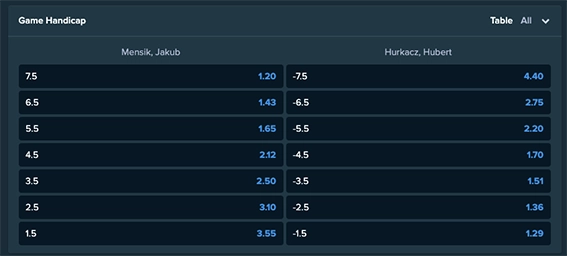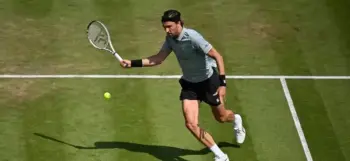Getting confused when looking at certain tennis odds or maybe when reading our predictions?
Tennis betting, like most sports betting markets, involves a wide range of terms that are crucial for anyone looking to engage in betting. Whether you’re a beginner bettor or a seasoned punter, understanding all of these terms is important for a lot of reasons.
This is a quick guide to understanding all the lingo, terms and betting types when looking at tennis betting online.
Basic Terms
Favorite
The player who is expected to win a match according to oddsmakers. Favorites have lower odds due to their higher chances of winning. As an example, in the Australian Open match Mensik, Jakub – Hurkacz, Hubert we see Hurkacz as clear favorite with the odds 1.25 (1/4 or -400). A $100 bet would win you $125 ($25 profit).
Underdog
The player who is expected to lose the match. Underdogs often have higher odds, offering potentially larger payouts if they win. In the same example as above, Mensik is the underdog at the odds of 4.20 (16/5 or +320).
Tie-Break
Played to decide the winner of a set when the score is tied 6-6. Involves a different scoring system and can be a focal point in betting.
Straight Sets
Winning a match without losing a set (ex 3-0 in Australian Open 5-Set Matches). Bets can be placed on whether a player will win in straight sets.
Betting Types in Tennis
This will help you when finding the various bets at your bookmaker site.
Match Betting/Odds or Moneyline
This is the most straightforward type of bet where you just predict the winner of a match. How he wins, doesn’t matter. For instance, if Player A has odds of 1.50 and Player B has odds of 2.60, a $100 bet on Player A would return $150 if they win, while the same bet on Player B would return $260.
Set Betting
Here, you bet on the exact final score in sets. For example, in a best-of-five sets match, you can bet on Player A to win 3-0 or 3-1 or 3-2. This has to be exact as you bet and therefore the odds are quite high.
Game Handicap
In this market, one player gets a virtual advantage or disadvantage in games. For instance, if Player A has a -3.5 game handicap with odds of 1.85 against Player B, Player A needs to win the match by 4 games more than Player B. If you bet $100 on Player A, they must win with at least a 4-game difference for you to get $185 back.

Total Games (Over/Under)
You bet on whether the total number of games played will be over or under a given number. If the line is set at 22.5 with odds of 1.90 for both over and under, and you bet $100 on over, the match must have at least 23 games for you to win $190. For example, if the result is
Total Sets (Over/Under)
How many sets will there be in the match? In a 5-set match you can for example bet on “Over 3.5” or over “4.5” if you think the result will be 3-1 or 3-2 in sets. If the favorite ends up winning in straight sets 3-0, you’ll then lose the bet.
Parlay (Accumulator)
This bet combines multiple selections into one wager, offering higher potential returns but increased risk as all selections must win. For example, betting on three players to win their matches with odds of 1.50, 1.75, and 2.00 respectively in a parlay, a $100 bet would return $525 if all three win.
Futures
Futures bets are on outcomes of future events, like the winner of a tournament. The odds are usually higher due to the long-term nature. For instance, if Player A is at 5.00 to win a Grand Slam before it starts, a $100 bet would return $500 if they win the tournament.
Spread Betting / Set Handicap
Similar to game handicap, but here you bet on the number of sets. If Player A has a -1.5 set spread with odds of 2.10 against Player B, Player A must win by 2 sets (e.g., 2-0 in a best-of-three). A $100 bet would yield $210 if successful.
In-Play Betting
Live betting on a match while it’s happening with dynamic odds that changes constantly within seconds. For instance, if Player A starts losing, their odds to win might increase to 3.00 during the match, and a $100 bet at this stage would return $300 if they make a comeback and win.
General Sports Betting Terms
These are some common terms in betting, not necessarily related to only tennis.
Stake
The amount of money wagered on a bet.
Payout
The total amount of money returned on a winning bet, including the initial stake.
Bankroll
The total amount of money you set aside for betting purposes.
Hedging
Hedging is a strategy used in tennis betting to ensure profit or minimize potential losses from an original bet. This is typically done by placing a bet on the opposite outcome of an initial wager, often during in-play or later stages of a tournament.
A Push
Basically a tie, when you neither win or lose your bet and get your initial stake back.
Odds format
You can see the odds in Decimal (EU, Canada), Fractional (UK) and American (USA) odds. Read more about betting odds.
Even Money
A term for when a player is 2.00 (1/1 or +100). If you win an even money bet, your profit is exactly the amount you bet.
Asian Handicap
Similar as the standard Handicap betting but the key differences in betting are in their complexity, the way they handle draws, and the potential for a refund. Basically it’s a 2-way market which eliminates the possibility of a draw.
It eliminates the draw option by using half and quarter goals/points. It offers more flexibility with half and quarter bets, where a draw (after the handicap is applied) can lead to a partial or full refund.
Arbitrage
A strategy involving placing bets on all possible outcomes of an event with different bookmakers (at different odds) to ensure a profit regardless of the result.
Edge
The advantage a bettor has over the bookmaker. Learn strategies to improve your edge when placing bets.
Rollover
A requirement in some betting promotions where a bettor must wager a certain amount of money before withdrawing. ThIs is pretty standard for all welcome bonuses at sportsbooks.
Vigorish (Vig)
The commission charged by bookmakers, built into the odds.















